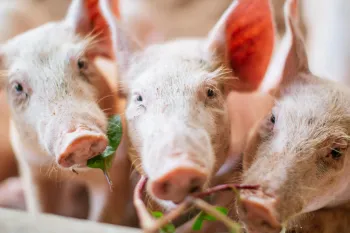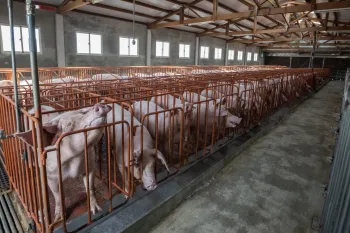For many of us, the new year is a time for resolutions and open reflections on the broader impacts of our choices. For millions of eager high school seniors in the U.S., it’s also a time to begin making one of the biggest decisions of their lives to date: which college to attend. While tuition costs and curriculums are certainly influential factors in making this decision, so are campus amenities such as student clubs, athletic programs and dining halls. Enter our new College and University Protein Sustainability Scorecard, designed to help students navigate this choice by showing which institutions are making progress in expanding plant-based dining options and reducing greenhouse gas emissions.
Our food systems have an enormous impact on animals and the environment. According to the United Nations, one-third of all human-created greenhouse gas emissions are caused by the production of food, with the majority of these emissions attributed to animal agriculture. The industry that raises nearly 9 billion land animals for food each year in the U.S. alone is also responsible for widespread pollution, biodiversity loss and antibiotic resistance. While organic products or locally sourced goods are often touted as the quickest ways to reduce our diet’s climate footprint, they pale in comparison to the impact of shifting menus at major dining operations away from meat and other animal products.
Today’s rising college students are part of Gen Z, a generation comprised of globally conscious changemakers who are very vocal about their commitment to sustainable practices and their insistence that large institutions, such as the universities they attend, do the same. One of the growing ways students are looking to have a more positive impact on the world around them is by reevaluating what’s on their plates.
Eager to mitigate these negative impacts, more than a third of Gen Z members are limiting their meat consumption in some way, and over half prefer institutions that similarly prioritize lowering their food-related environmental impacts in operational standards. It’s no surprise, then, that when it comes to which college or university to attend, these students are assessing prospective schools based on their demonstrated commitment to creating healthier, animal-friendly and sustainable menus. Our College and University Protein Sustainability Scorecard, which is inspired by the success of our Food Service Industry Protein Sustainability Scorecard, not only identifies institutions that set and meet impressive goals but also examines which are prioritizing food-related sustainability with concrete strategies. For instance:
-
University of Colorado Boulder has committed to implementing 75% plant-based menus by the end of this year. Further, CU Boulder already offers plant-based meal options at every station. The dining team regularly collaborates with the university’s marketing department, environmental center and on-campus groups to engage and educate students on plant-based eating.
-
Up north, University of Michigan–Ann Arbor has hosted our Food Service Innovation team on campus several times in the past two years for culinary trainings on plant-based protein foundations for staff and students.
-
The dining operation at Washington State University offers staff training through biannual culinary bootcamps that incorporate plant-based concepts, as well as “Moments with Martha” to help students learn healthy eating habits directly from its registered dietitian.
-
Rutgers University added carbon footprint icons to each meal on its menus to encourage students to make more sustainable food choices.
Two-thirds of Americans agree that efforts to reduce the effects of climate change must be prioritized to ensure a sustainable planet for future generations. With this report, we hope to shine a positive light on each of the schools that has been doing just that. For those schools that fell short, we encourage them to join our efforts in creating a healthier, more sustainable food system by prioritizing plant-based menu items and thereby investing in the future of their students—in this and every generation to come.
If you are a student, parent, faculty member or otherwise associated with one of the schools in this report and would like to see your institution implement more sustainable menus, we recommend reaching out to your dining team and politely requesting that more plant-based options be added. Our Food Service Innovation team is eager to assist schools in creating delicious and nutritious plant-based meals that all students will enjoy, so please reach out to us at ForwardFood.org for additional information or support.




